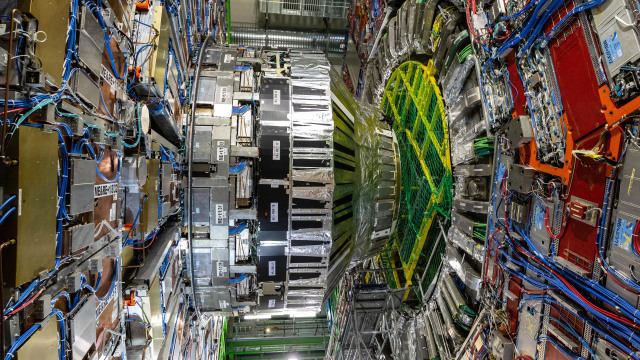

Run 3: What to expectĪs the name suggests, Run 3 is the third science run of the LHC and will begin on July 5, 2022.

As soon as the LHC is back up and running, we can expect discoveries to continue.
#Higgs boson supercollider series#
Between its creation and the opening of the LHC, CERN was responsible for a series of groundbreaking discoveries, including weak neutral currents, light neutrinos and the W and Z bosons. The organization was established in 1954 (opens in new tab) following a recommendation by the European Council for Nuclear Research - or Conseil Européen pour la Recherche Nucléaire in French, from which it gets its name. The first tantalizing hints that a breakthrough might be just around the corner came in 2021 when analysis of LHC data revealed patterns of behavior (opens in new tab) that indicated small but definite departures from the Standard Model.Īccording to CERN, the LHC opened for business in 2009, but CERN's history goes back much further than that. Related: 10 mind-boggling things you should know about quantum physics Even so, all those new particles still lie within the bounds of the Standard Model, which the LHC has struggled to move beyond (opens in new tab), much to the disappointment of the numerous scientists who have spent their careers working on alternative theories. But the Higgs boson is far from being the LHC's only discovery.Īccording to the physics magazine CERN Courier (opens in new tab), the LHC has also found around 60 previously unknown hadrons, which are complex particles made up of various combinations of quarks. Its huge significance came from the fact that it was the last prediction of the Standard Model that hadn't yet been proven. Although widely referred to as the "God particle", it's not really as awesome in itself as that name might suggest. The LHC's biggest moment came in 2012 with the discovery of the Higgs boson. (Image credit: Ket4up via Getty Images) (opens in new tab)

The LHC smashes particles together at high speeds, creating a cascade of new particles, including the infamous Higgs boson. Large Hadron Collider discoveries and history As strange as it sounds, physicists are itching to find a few holes in the Standard Model because there are some things, such as dark matter and dark energy, that can't be explained until they do. Like all physics experiments, the LHC aims to test theoretical predictions - in this case, the so-called Standard Model of particle physics - and see if there are any holes in them. Finally, the C stands for 'collider' - the LHC accelerates two particle beams in opposite directions, and all the action takes place when the beams collide.

The middle letter, H, stands for 'hadron', the generic name for composite LHC particles such as protons that are made up of smaller particles called quarks. The 'large' that the L stands for is an understatement the LHC is by far the biggest accelerator in the world right now, occupying a circular tunnel nearly 17 miles (27 kilometers) in circumference. The LHC is a particle accelerator - a device that boosts subatomic particles to enormous energies in a controlled way so that scientists can study the resulting interactions, according to the CERN LHC fact sheet (opens in new tab). When Run 3 commences we can expect a whole new spate of discoveries, so it's a good time to take a closer look at what makes the LHC - and the rest of CERN - so unique. If you see a news headline about exotic new subatomic particles, the chances are the discovery was made at CERN, the European Organization for Nuclear Research, located near Geneva in Switzerland.Ī recent example occurred in January 2022, when CERN scientists announced " evidence of X particles (opens in new tab) in the quark-gluon plasma produced in the Large Hadron Collider." Hiding behind that technospeak is the eye-popping fact that CERN succeeded in recreating a situation that hasn't occurred naturally since a few microseconds after the Big Bang.


 0 kommentar(er)
0 kommentar(er)
